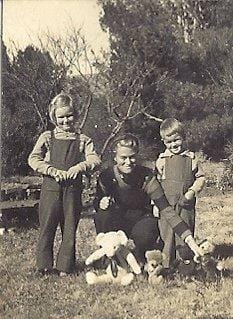Biltong and Green Pawpaws

Joan Millard and her niece and nephew, Angela and Tim Hughes missed their days at Herschel in the Cape.
Biltong and Green Pawpaws
After Joan’s father’s estate was settled she and the children, Angela and Tim, travelled by train, departing Sunday midday from East London to Kimberley and then on to Rhodesia.
On Wednesday, at midnight, the train disgorged them on to Que Que’s deserted platform. “Where’s Daddy?” asked Angela and Tim disappointedly. Joan felt the same. After sitting on the luggage for some time, she found Gervas asleep in his Chevrolet truck.
Biltong and Green Pawpaws
It was a starry night, but hot, even for midnight. Her heart sank at the farmhouse, devoid of her sister’s bubbling presence. She had not visited since Barbara’s death. Thousands of mosquitoes seemed to surround the lamp. There was no refrigerator, no telephone, no lighting and, worst of all, no filtered water.
They had tea before she tucked the two into bed under tired looking mosquito nets and fell into bed beside them.
With so many men at war, Gervas was running two other farms besides his own to help out. He left very early the next morning and was away for a week.
The African cook, Philip, who looked after him, resented her arrival. They had words before he calmed down. He adored the children and in no time they were all chatting away in the local language.
But the children complained it wasn’t like Herschel and when were they going back? She got going with a great washing of nets and sheets in the pale brown water which came up in a Scotch cart, drawn by oxen from the muddy Que Que River at the bottom of the farm. She darned the nets, one of which was large enough to fit over all three beds. Sprayed, it was mosquito free.
The kitchen gave her the shivers as Philip had taken to storing old tins and hides in it. There were further words as she cleaned out. The only meat available was biltong (jerky) which she grated and tried to vary. Vegetables were grown near the river: rather small stunted cabbages, and sweet potatoes and pumpkin. Pawpaws (papaya) were plentiful and were quite nice cooked green like marrow with a white sauce. There was plenty of milk and cream. She made butter, and the little picannins (young African children) brought small eggs to sell and the occasional scraggy chicken.
The house was set in the bush, which stretched away flat and green for miles. The P.K. (toilet) was distanced from the house, in the bush. She always accompanied the children as there was not a single day when she didn’t see a snake or kill one.
Gervas returned only on weekends. She organized a school for the children. They wore as few a clothes as was decent and spent much time playing in a small iron tub on the verandah.
The dogs were thrilled with the company, but had to be de-ticked daily, a job she loathed.
She would ride a horse into town to fetch the odd luxury food, like packets of jelly or custard powder. Many commodities were unobtainable or rationed.
“What about Christmas?” she asked Gervas, as it drew close.
“We’ve been invited by Bishop and Rosemary Paget in Salisbury,” he replied.
She was glad. She wanted Christmas to be lovely for the children. In Salisbury she would be able to find chocolates and a few toys on the black market.
Excerpt taken also from Rain on the Roof, by Joan (nee Millard) Freyburg (1999) ISBN 0 646 38477 5 with family permission. Tim Hughes has electronic copies of this wonderful book that may be available on request via the comments section of this blog.
